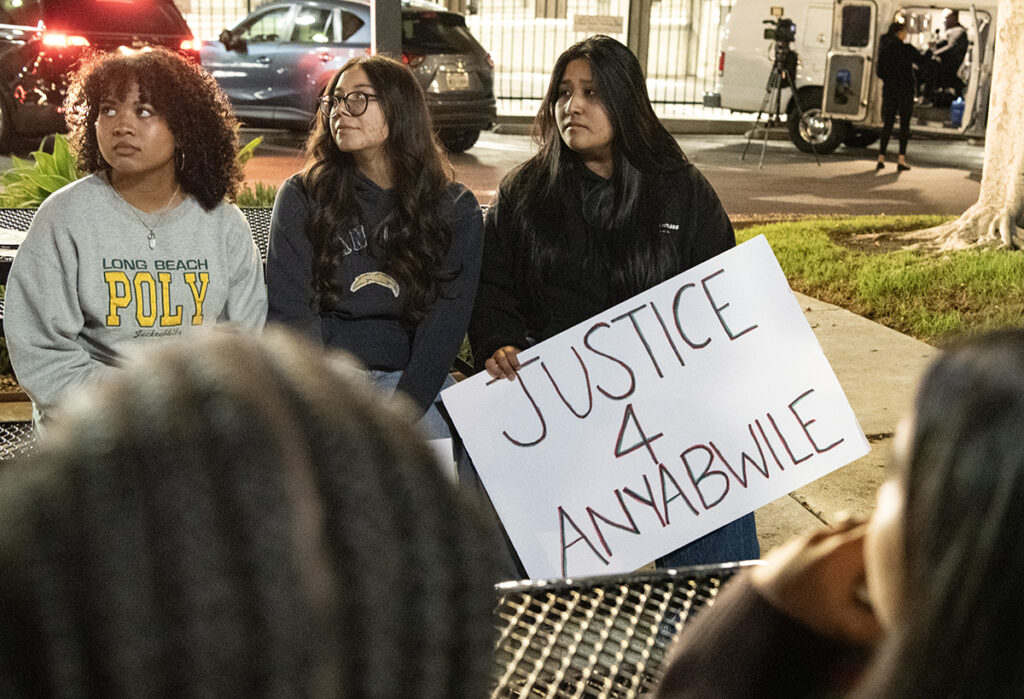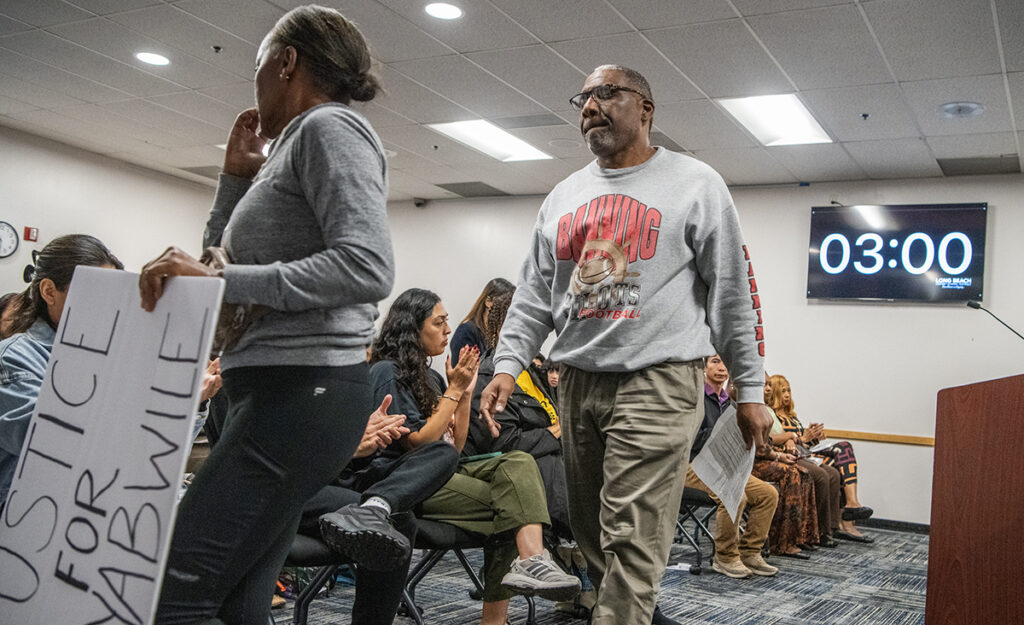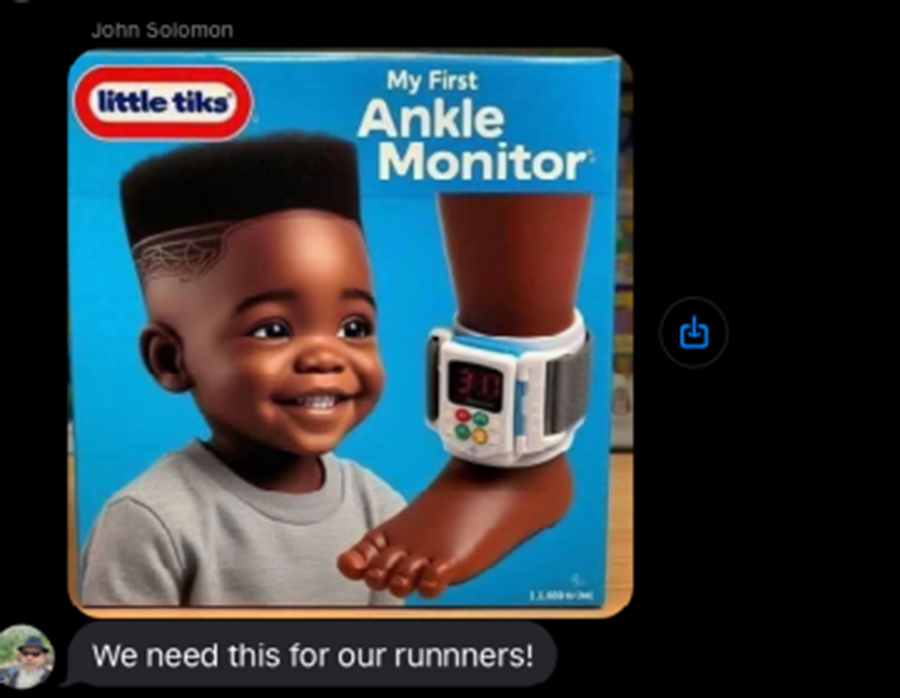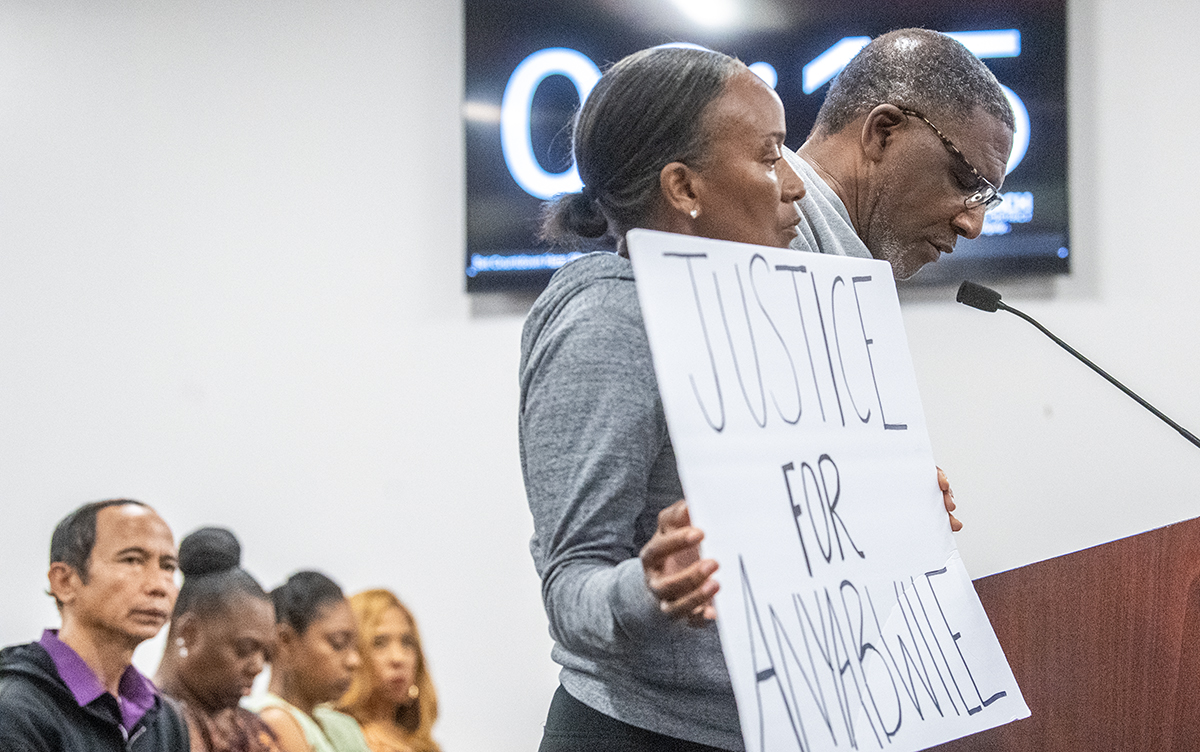The line to give public comment at Wednesday’s Long Beach Unified school board meeting stretched the length of the building as dozens of students, parents, teachers and community members gathered to voice concerns about racism in the district.
“Anti-Blackness is what’s preventing our schools from being true communities of belonging,” said Paryss Wills, a Poly High School student and youth leader for Californians for Justice, an organization that teaches high school students to fight for racial justice.
Many who took the lectern were prompted by two recent events: the removal of a Black counselor from Lakewood High School and a text message showing a Black child in an ankle monitor allegedly sent by a MacArthur Elementary teacher. These incidents elicited frustration, sadness and calls for action from members of the public, many of whom told school leaders they’re reflective of deeper issues harming Black LBUSD students.
Students say counselor was treated unfairly
Lakewood High School’s Black Student Union showed up in strong numbers to support a former counselor at their campus, Naazir Anyabwile, whose contract was not renewed last school year, first reported by the Voice of Black Los Angeles.
“It’s just suffocating being in an environment like that – you feel like you can’t learn,” Jenna Smith, a junior in Lakewood’s BSU, said, describing what she called a culture of racism at Lakewood. “One of our main focuses is to get our counselors back, get the people who we trust back.”

Anyabwile, who is Black, told the Long Beach Post he was under increased scrutiny and started receiving poor performance reviews after he did not substantiate claims against his Black female coworker, which Anyabwile said reflected a pattern of discrimination against Black staff.
Anyabwile filed a formal complaint to the district in June after Lakewood principal Mona Merlo raised concerns about his communication and interventions with students, though he had previously been evaluated as “effective” and praised as part of the “dream team,” according to records provided by Anyabwile.
“I am spoken to, evaluated, and disciplined differently than non-Black colleagues,” Anybawile wrote to the district. Four months later, records show, the district replied: The evidence did not demonstrate unwelcome or discriminatory conduct “that is severe or pervasive enough to create an abusive work environment toward you.”
The district attributed his cut to a “reduction in staffing,” according to documents provided to the Post by Anyabwile.
The district declined to discuss details of the situation with the Post, citing confidentiality rules, but an LBUSD spokesperson said they are reviewing the matter.
“We value the essential role counselors play in fostering welcoming and supportive environments for students,” the spokesperson said.
Black students say they feel Anyabwile’s absence acutely.

“We feel helpless. We are lost. We are scared coming to school every day knowing we don’t have any support,” Kasey-Rian Henson, a Lakewood senior, said at the school board meeting.
Henson and other Lakewood BSU members walked out of school last Friday and marched to Lakewood City Hall. They told the Post they have been intimidated and reprimanded by Lakewood administrators for their actions.
Judy Mbaka, president of the Lakewood BSU, said she was bullied in school and never given the opportunity to envision college before meeting Anyabwile. “His impact has helped me be able to realize that I am a strong African American woman,” she said in an interview.
“I’ve always gone beyond the job description to lift students higher,” Anyabwile said at the meeting, as community members held signs signaling support. “That is who I am as an educator: a builder of opportunities, not a problem to be managed.”
Speakers react to racist text
Other community members expressed dismay and betrayal over an image of a Black child wearing an ankle monitor allegedly sent by MacArthur Elementary School teacher John Solomon.
On top of evoking racist stereotypes, other educators said Solomon mocked disabled students, who allegedly wrote, “We need this for our runners,” referencing students who elope or run from campus.
Carolyn Essex, a community activist, said parents of students with disabilities already feel unseen. The image shared by Solomon “confirms their worst fears,” she said, about “how their children are viewed and treated in the classroom.”

Other speakers called for accountability. Jeannine Pearce, former member of the Long Beach City Council, asked the room: “If this incident was allowed to continue until the public intervened, what other complaints have been ignored, minimized or silenced?”
The district declined to investigate the incident until the Post published a series of stories bringing the events to light, which some community members said they saw as evidence of the district’s slow response to address racism and ableism.
Several speakers invoked the LBUSD excellence and equity policy, passed in 2021 after the nationwide racial reckoning and in response to pressure from Black parents. The policy says that “equity in LBUSD means that we will take action to end systemic racism and discrimination” and “center the needs of our Black, Indigenous, People of Color (BIPOC) and students with disabilities within our efforts to deliver an excellent educational experience to all students.”
Years after the policy’s passage, some say they have yet to see meaningful action. Ahuitz Romo-Gonzalez, an organizer at Californians for Justice, said the racist text and outrage of Lakewood students were “a symptom of a system that has not yet done the deep work required to protect its Black students and students with disabilities.”
The conversation “must be about the district’s actions,” he said, calling for recruitment and retention of staff that foster student safety and acceptance.
After more than an hour of public comment, board members swiftly turned their attention back to agenda items, including a plan to increase the number of Sankofa Parent Villages to support Black parents and students, part of ongoing district efforts to prioritize Black student achievement and belonging, including recently opening a Center of Black Student Excellence.

